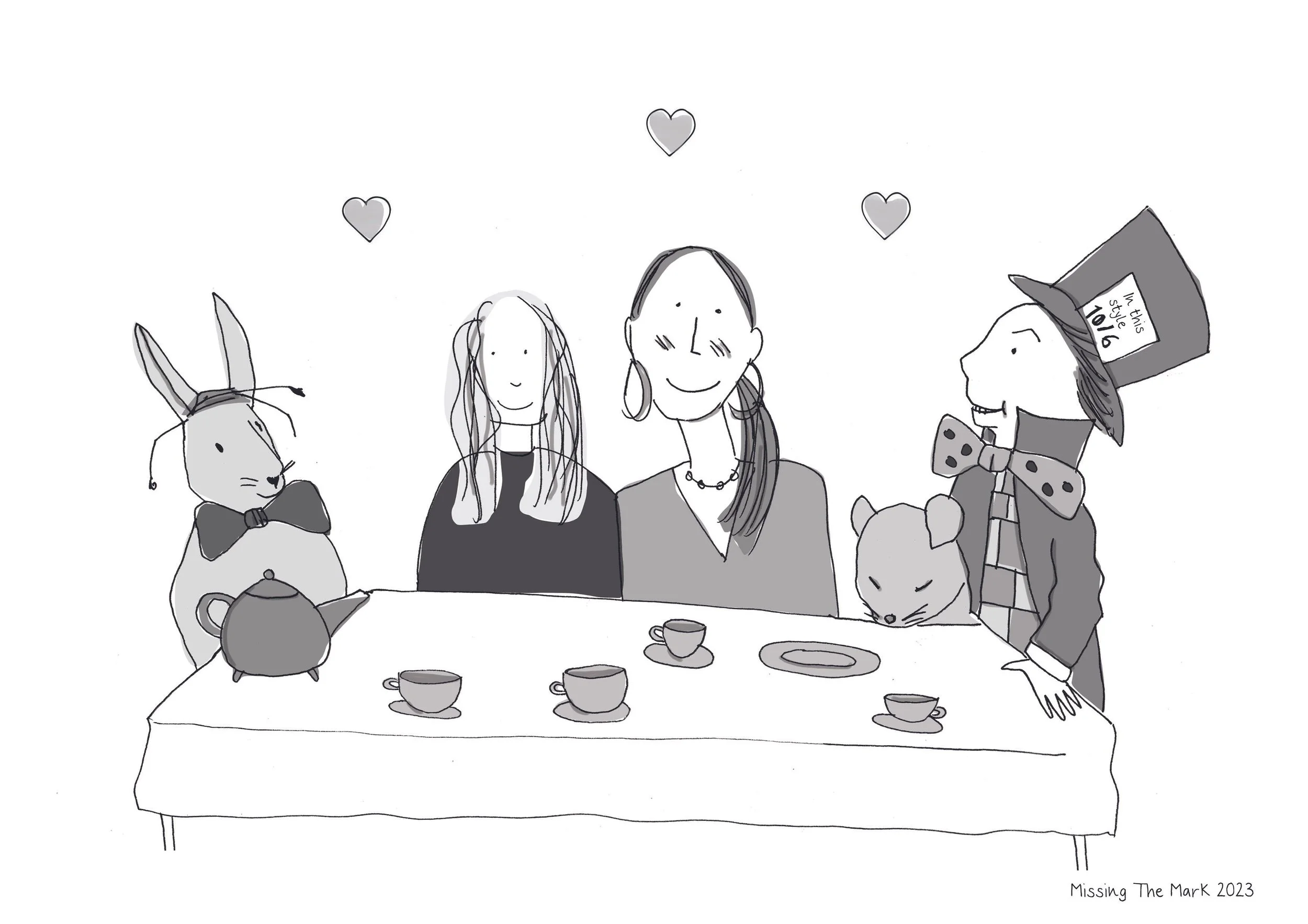
“It’s no use going back to yesterday because I was a different person then.”
— Lewis Carroll, Alice’s Adventures in Wonderland, 1865 .
Neuroqueer
"To neuroqueer is to actively subvert, transform, and liberate. It is not only an identity; it’s a revolutionary practice of becoming."
— Nick Walker, Neuroqueer Heresies (2021, p. 10)
Neuroqueer: Embracing Fluidity and Disrupting Norms
At Alice’s Wonderland, I celebrate and explore neuroqueer as coined and expanded by Nick Walker—a concept that challenges the idea of “normal” on every level. Neuroqueer merges the principles of neurodiversity and queer theory, encouraging us to dismantle rigid assumptions about mind, identity, and the ways we relate to one another. Recent work (Botha, 2022; Chapman, 2021) situates neuroqueer within broader neurodiversity scholarship, extending its role as a practice of resistance.
In Alice in Wonderland, Alice’s constant shape-shifting and the nonsensical logic of Wonderland echo the neuroqueer ethos: that human experience is fluid, and any single standard of “normal” is illusory.
“You must be mad, or you wouldn’t have come here.”
— Lewis Carroll, Alice’s Adventures in Wonderland, 1865 .
✰ What Is Neuroqueer?
✰ A Hybrid of Queer Theory and Neurodiversity
Queer theory questions societal norms around gender, sexuality, and identity; neurodiversity advocates for viewing diverse neurologies as natural human variations. Neuroqueer fuses these frameworks, rejecting the notion that there’s one “correct” way to exist or think.
✰ A Rebellion Against Normality
Neuroqueer thinking sees so-called “norms” as social constructs that can be oppressive—especially for those who diverge from mainstream ideas of acceptable cognition, expression, or behaviour. This refusal aligns with narrative disobedience, rejecting imposed logics of “normal” storytelling and selfhood
✰ An Ongoing Practice of Self-Discovery
Being “neuroqueer” means continually questioning and reinventing how we present ourselves, how we communicate, and how we carve out space in a world that values conformity. It’s an active stance, not just an identity label.
☆ Ties to Alice in Wonderland
In Alice’s Adventures in Wonderland, Alice constantly morphs—growing and shrinking at unexpected times, conversing with creatures that defy logic, and navigating an ever-changing environment. Neuroqueer invites us to do the same with our identities and expressions:
✩ Fluidity: Like Alice changing size, we embrace changing perspectives and evolving ways of being.
✩ Distorting Norms: Wonderland’s characters undermine everyday logic, just as neuroqueer refuses to accept society’s definitions of “correct” or “standard” behaviour.
✩ Freedom in Authenticity: Just as Alice learns to trust herself, neuroqueer thinking affirms that we have the right to define our own realities, unconstrained by social expectations.
☆ Key Elements of Nick Walker’s Neuroqueer Concept
✩ Self-Expression Without Apology
Neuroqueer recognises that behaviours like stimming, direct communication, or strong special interests are not “lesser,” but valid expressions of self.
Instead of repressing these, we cultivate environments where such expressions are welcomed. This nurtures neurokinship, connection built through authentic expression rather than compliance
✩ Defying Binary Thinking
Just as queer theory dismantles binaries (male/female, gay/straight), neuroqueer challenges binaries in how we view minds (neurotypical/neurodivergent, normal/abnormal).
We understand that people don’t have to fit neat categories to be valued or valid. This also resists neuronormativity—the assumption that neurotypical binaries and standards define reality.”
✩ Creativity and Playfulness
Nick Walker often highlights the creative potential of minds that don’t abide by conventional rules.
Neuroqueer sees these divergences as innovations, akin to Wonderland’s nonsensical solutions that turn out to be surprisingly insightful.
☆ How Neuroqueer Shapes Alice’s Wonderland
✩ Welcoming Diverse Realities
I intentionally designed Alice’s Wonderland to be a place where personal rhythms—whether linguistic, social, sensory, or creative—are openly explored and respected.
✩ Valuing “Weirdness” as a Strength
In the spirit of Wonderland, I celebrate what society might label “weird.” Neuroqueer frames weirdness as a portal to imagination, empathy, and community-building rather than something to hide.
✩ Rejecting Compliance Culture
Instead of demanding that people conform to a single notion of “proper” behaviour, I encourage self-expression that might seem nonsensical to outsiders but is deeply meaningful for those who practice it. In Wonderland this becomes part of a wider narrative ecosystem—diverse, nonlinear expressions sustaining collective culture
✩ Centring Lived Experience
Building on Nick Walker’s assertion that neuroqueer is an active process, I amplify the voices of those who “live” neuroqueer daily, ensuring they drive conversations about how we create and share spaces.
☆ An Invitation to Wonder
Just as Alice steps beyond the constraints of everyday life to discover Wonderland, neuroqueer urges us to cast aside limiting definitions of identity or cognition. We expand our minds by welcoming new possibilities—allowing ourselves the freedom to be fluid, to question everything, and to find delight in what others might call “nonsense.”
Here in Alice’s Wonderland, “nonsense” is often where the most profound truths emerge. When we let go of rigid expectations, we uncover the unlimited potential of truly living as ourselves—in all our delightful oddity and brilliance.
To neuroqueer is to claim freedom not only as identity but as practice—where narrative disobedience, neurokinship, and structural empathy failure converge to unsettle the ‘normal’ order
➽ This entry is part of the Key Concepts series at Alice’s Wonderland, exploring the frameworks that shape how we think, connect, and create. If you’d like to contribute your own reflections or join the conversation, we’d love to hear from you.

